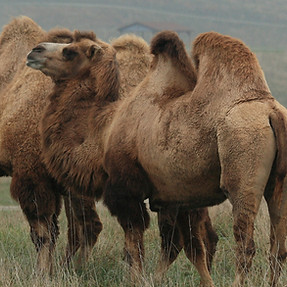
Covering one third of the Earths surface, Deserts are one of the most arid, dry and inhospitable places in the world.
They range from the hot Sahara, Arabian and Kalahari to the frozen Arctic and Antarctic tundras. Whether they're boiling hot or freezing cold they are all categorised a Desert by the fact that they receive less than 10 inches of rainfall per year.
Australia and Antarctica share the title of the driest continents in the world. Australia has the highest number of Deserts with it actually being made up of two thirds Desert!
The famous Saharan desert is the largest hot Desert in the world and covers much of Northern Africa. It's mainly rocky but in places it's naturally wind-shaped sand dunes can reach heights of nearly 600ft! That's twice the height of the USAs Statue of Liberty.

DID YOU KNOW
The Sahara desert in North West Africa is the largest in the world! At over 9million km² it's bigger than the entire country of Brazil!

Apart from a 4x4 the camel is the perfect partner to transport you over the great deserts.
There are 2 types of camel. One lives in sandy deserts and is called a Dromedary. It has only a single hump and is found in the Sahara desert, North Africa, the Middle East and Australia.
The other type of camel is the Bactrian. This one has 2 humps and is at home in rockier deserts in Central and Eastern Asia. You can still find wild ones in the Gobi desert in Mongolia and in China!
Here I am, on the right, riding a Dromedary camel in the great camels races in Algeria. It's a Toureg celebration that celebrates the changing of the season!
WHO LIVES IN THE DESERT?
Nearly 1 billion people live in the desert!
Hi i'm a member of the Tuareg people and we live in the Sahara desert in countries such as Algeria, Libya and Mali which are all in the continent of Africa.
As well as the Tuareg people there are also the San people who live in Africa. The Tuareg live in the North and the San live in the South in the Kalahari desert.
You can find out more about these people and other desert dwellers like the Aboriginals of Australia HERE.
Many people who live in desert tribes often have an incredible wealth of information and skills to cope with the lack of water and heat. Many are nomadic which means they do not have a permanent settlement. They must travel and stop for short amounts of time when they come across a water source.
There are also many great modern cities that have been built in the desert such as Las Vegas in the USA and Abu Dhabi in the United Arab Emirates. Temperatures in these cities can reach over 40˚C. Air conditioning is vital here and many people don't venture outside in the height of summer!
DESERTS OF THE WORLD
ACTIVITY
1. Look up one of the deserts above.
2. What sort of desert is it, sandy, rocky, cold, hot?
3. What sort of camel would be best to use as transport there? Or is it too cold?
Arctic
Antarctic
Arabian
Atacama
Chihuahuan
Colorado Plateau
Gibson
Gobi

Great Basin
Great Sandy
Great Victoria
Kalahari
Karakum
KyzlKum
Mojave
Namib
Patagonian
Sahara
Simpson
Sonoran
Sturt Stony
Takla Makan
Tanami


Thorny Devil
Type of animal - Reptile
Maximum Length - 20cm
Region - Australia
Diet - Ants and Termites




Caracal
Type of animal - Mammal
Maximum Length - 1m
Diet - Rodents and low flying birds
Bactrian Camel
Type of animal - Mammal
Maximum Length - 3.5m
Region - China and Mongolia
Diet - Plants and Shrubs

Goliath Tarantula
Type of animal - Arachnid
Maximum Length - 30cm
Region - South America
Diet - Rodents and even small birds!

Meerkat
Type of animal - Mammal
Maximum Length - 50cm with tail
Region - Southern Africa
Diet - Insects and plants

Dromedary Camel
Type of animal - Mammal
Maximum Length - 3.5m
Region - Middle East and Australia
Diet - Plants and Shrubs

PSST... DID YOU KNOW?
The Great Pyramids of Giza in Egypt were built in the Sahara desert and are over 4,500 years old. Built by the ancient Egyptians as tombs for their Pharaohs it must have been very very hard work. Amazingly these 3 were all built within 85 years!
Let's learn about the world's Deserts.
Scroll down or click on the links below to learn more the really hot and really cold types of deserts.



